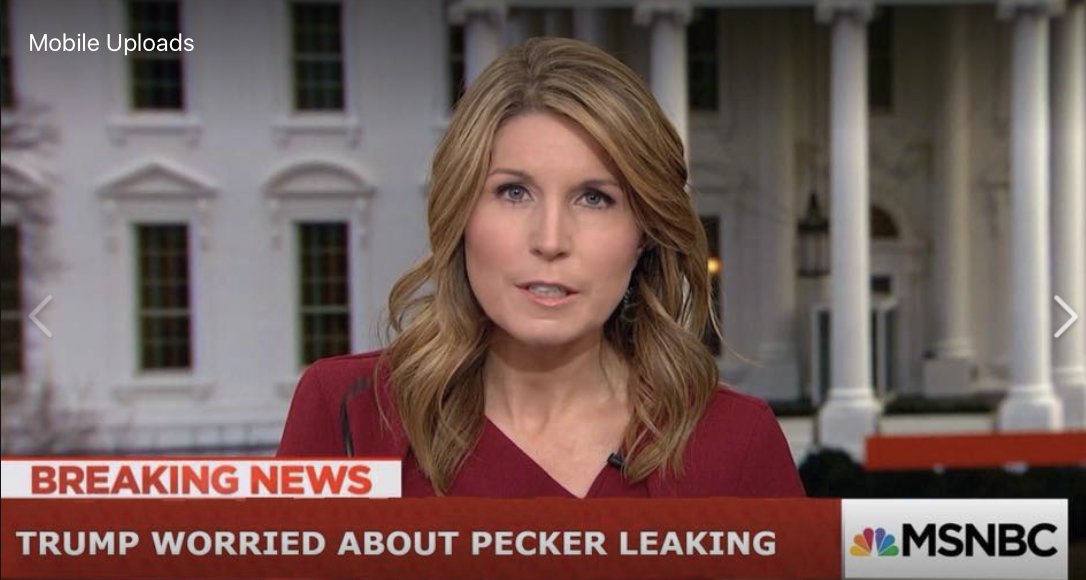One of the more intriguing developments in Robert Mueller’s investigation into Russian interference in the U.S. 2016 election was that David Pecker had been granted immunity from prosecution.

Pecker, CEO of the National Enquirer, has decades’ worth of records of the tabloid’s “catch and kill” deals, in which “exclusive rights to people’s stories were bought with no intention of publishing to keep them out of the news,” the Associated Press reported.
Many concerned Trump, the AP says.
The concept of these records making their way to federal investigators is, to say the least, intriguing.

There was also some merriment based on Pecker’s name, in which somebody behind the scenes at MSNBC would seem to be either mischievous — or maybe a bit clueless.
It’s a fake, of course. We can’t seem to match it perfectly with the original (Snopes did) but they make a convincing case that it’s a Photoshopped screenshot of this MSNBC broadcast from January.
Here’s the closest we can get.
Where did it originate? The embedded tweet above is the earliest one we can find, but the cropping is a bit wrong for it to be first. This is the version that went viral, however:
The example above is a pretty second-rate effort (they didn’t get the typeface quite right, and MSNBC’s text background has more variation of colour), but there are sites that will make more professional-looking versions, like breakyourownnews.com.
The thing is, cable news chyrons (the text on the screen) can be funny, intentionally or unintentionally. Here’s our favourite example, from the BBC in July:
But, as with screenshots of tweets, only trust them as far as you trust the source.

- What is a halal mortgage? How interest-free home financing works in Canada
- Ontario doctors offer solutions to help address shortage of family physicians
- Capital gains changes are ‘really fair,’ Freeland says, as doctors cry foul
- Budget 2024 failed to spark ‘political reboot’ for Liberals, polling suggests
In brief:
- Poynter profiles David Puente, an Italian hoax-debunker who has angered his targets to the point that he’s been doxxed, received death threats and had fake reports that he’s been arrested, which the real police have said publicly are false. “Who is not afraid is crazy, but I do not want them to win,” he says.
- The Atlantic looks at Russia’s attempts to exert influence over “fight clubs, neo-Nazi soccer hooligans, and motorcycle gangs” in Europe and, in one instance, Florida. “Many are genuine partnerships based on a shared aversion to liberal democracy and a desire to undermine it.”
- On Thursday, U.S. president Donald Trump accused NBC of “fudging” an interview with him in which he discussed former FBI director James Comey’s firing. As author Clint Watts points out, the existence of high(er)-quality fake audio and video “will soon be a cover for getting away with anything.” “The existence of tools that can be used to seamlessly alter photos and videos becomes a meta-tool for denying all types of evidence, except that which we see with our own eyes,” added the University of Washington’s Kate Starbird. “This fits right in with strategies of undermining trust in… everything.”
- Long read from Craig Silverman at BuzzFeed about Michael D. Moore, an ex-reporter who turned firmly to the dark side as the operator of True Pundit, a Pennsylvania-based fake news site. Moore operated as ‘Thomas1774Paine’ until Silverman unmasked him, but, he writes, ” … the reality is his audience is already invested in his fake scoops about the deep state, out-of-control federal agencies, and child exploitation. They will almost certainly stay with him.”
- Facebook has been letting an advertiser target LGBTQ users with “ads promoting ‘sexual purity’ and gay conversion therapy,” the Telegraph reports. It’s paywalled, but there are summaries here and here.
- In Wired, a long read on the enormously destructive NotPetya cyberattack, focusing on the chaos it caused to Maersk, the shipping giant. “Only when you start to multiply Maersk’s story — imagining the same paralysis, the same serial crises, the same grueling recovery — playing out across dozens of other NotPetya victims and countless other industries does the true scale of Russia’s cyberwar crime begin to come into focus,” Andy Greenberg writes.




Comments